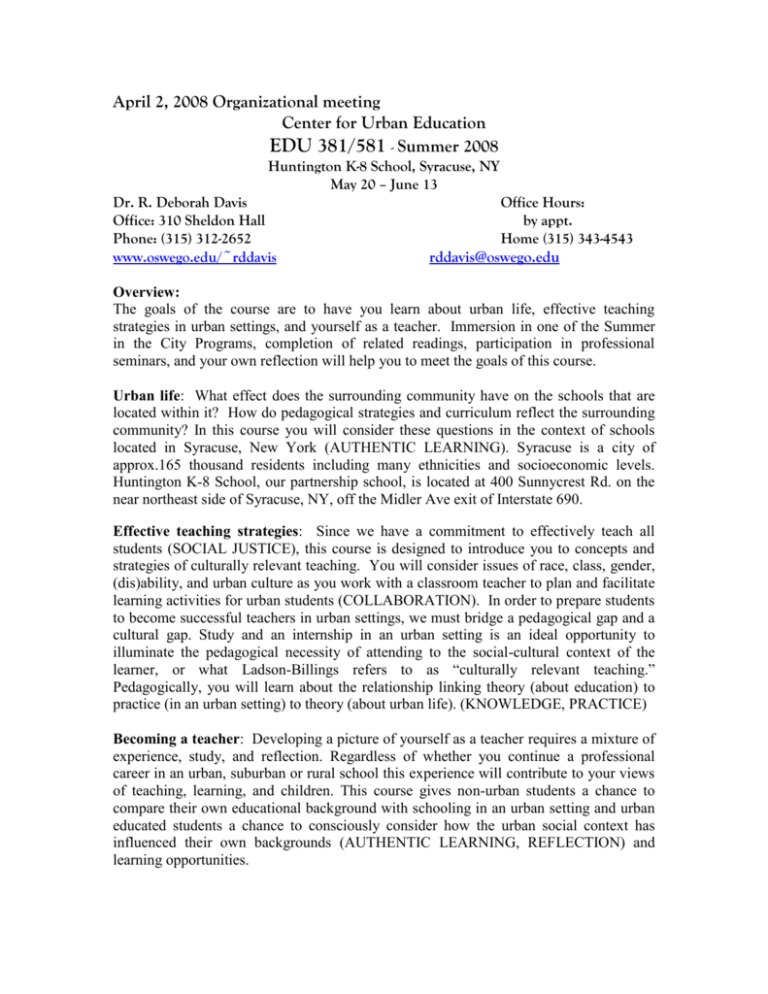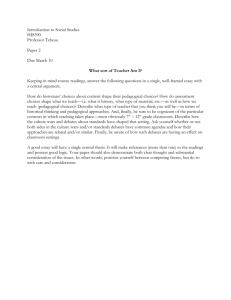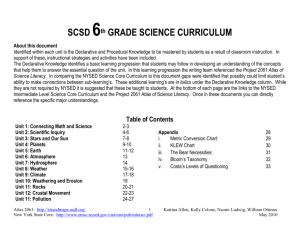EDU 381
advertisement

April 2, 2008 Organizational meeting Center for Urban Education EDU 381/581 - Summer 2008 Huntington K-8 School, Syracuse, NY May 20 – June 13 Dr. R. Deborah Davis Office: 310 Sheldon Hall Phone: (315) 312-2652 www.oswego.edu/~rddavis Office Hours: by appt. Home (315) 343-4543 rddavis@oswego.edu Overview: The goals of the course are to have you learn about urban life, effective teaching strategies in urban settings, and yourself as a teacher. Immersion in one of the Summer in the City Programs, completion of related readings, participation in professional seminars, and your own reflection will help you to meet the goals of this course. Urban life: What effect does the surrounding community have on the schools that are located within it? How do pedagogical strategies and curriculum reflect the surrounding community? In this course you will consider these questions in the context of schools located in Syracuse, New York (AUTHENTIC LEARNING). Syracuse is a city of approx.165 thousand residents including many ethnicities and socioeconomic levels. Huntington K-8 School, our partnership school, is located at 400 Sunnycrest Rd. on the near northeast side of Syracuse, NY, off the Midler Ave exit of Interstate 690. Effective teaching strategies: Since we have a commitment to effectively teach all students (SOCIAL JUSTICE), this course is designed to introduce you to concepts and strategies of culturally relevant teaching. You will consider issues of race, class, gender, (dis)ability, and urban culture as you work with a classroom teacher to plan and facilitate learning activities for urban students (COLLABORATION). In order to prepare students to become successful teachers in urban settings, we must bridge a pedagogical gap and a cultural gap. Study and an internship in an urban setting is an ideal opportunity to illuminate the pedagogical necessity of attending to the social-cultural context of the learner, or what Ladson-Billings refers to as “culturally relevant teaching.” Pedagogically, you will learn about the relationship linking theory (about education) to practice (in an urban setting) to theory (about urban life). (KNOWLEDGE, PRACTICE) Becoming a teacher: Developing a picture of yourself as a teacher requires a mixture of experience, study, and reflection. Regardless of whether you continue a professional career in an urban, suburban or rural school this experience will contribute to your views of teaching, learning, and children. This course gives non-urban students a chance to compare their own educational background with schooling in an urban setting and urban educated students a chance to consciously consider how the urban social context has influenced their own backgrounds (AUTHENTIC LEARNING, REFLECTION) and learning opportunities. Through reading, individual reflection, writing, and collaboration with NY teachers and other interns (COLLABORATION AND LEADERSHIP), you will gain an understanding of contextual, personal, and pedagogical issues related to teaching in an urban school. As a result of participating in this course you will: Identify and describe social, cultural, political and economic factors which influence the schooling of urban students; (KNOWLEDGE, SOCIAL JUSTICE) Compare and contrast your lived experience and college course experience with your observations and participation at the Syracuse school and analyze how these differences would play out if/when you work as a teacher in an urban school; Compare and contrast urban schooling as it appears in the literature with your observations in an urban school setting; (KNOWLEDGE, PRACTICE) Describe the factors involved in evaluating the effectiveness of teaching strategies used in an urban setting; (KNOWLEDGE, PRACTICE) This course satisfies the NCATE and NYSED expectations for pre-teachers to have an extensive experience in an urban setting. It also serves as a step toward the commitment of the School of Education and Curriculum & Instruction Department to address the projected urban teacher shortage, by developing teachers who are willing to and capable of successfully teaching in the state’s urban schools. CLASS STRUCTURE: In Class On campus, we will meet for two three- hour class sessions at the beginning of the summer semester (May 20 & May 22). We will also meet for two three- hour class sessions following the two week field placement (June 10 & June 12. In- class activities will include small and large group discussion, presentations and individual work. All assignments will be due the last day of class unless otherwise assigned. Field Placement In between these class sessions, you will spend two weeks at Huntington school in Syracuse (May 27 – June 6, 2008). We will also meet for two onehour sessions during each week in Huntington (TBA). You are expected to attend an orientation meeting at the school and to attend school during regular school hours, meet with teachers, administrators and your classmates after school hours. During the school day, you will be assigned to work with one teacher, but you will have the opportunity to visit other groups of students/teachers throughout the day. Keep a learning log/journal Outside of Class: You are expected to spend a significant amount of time reading, writing, meeting with classmates, preparing assignments and developing a final project. REQUIRED TEXTS: ( AT KRAFTEES AND COLLEGE BOOK STORE) (1) Ladson-Billings, G.J. (1994). Dreamkeepers. San Francisco: Jossey-Bass (2) Delpit, Lisa. (1995). Other People’s Children: Cultural conflictin the classroom. New York: New Day Press. (3) Marx, S. (2006). Revealing the invisible: Confronting passive racism in teacher education. New York: Routledge Taylor & Francis Group. RESPONSIBILITIES: Participate in on campus classes and on-site practicum placement. (20%) ** Write an initial Cultural Autobiography (draft of final) Keep a learning journal and media watch log. This will serve as one of the primary documents for use in your ongoing self-assessment. You should collect and respond to the language used in the newspaper and television or other visual media reports of urban schools. Your responses might contain: questions/ puzzles about the readings or what happens in class applications to your own life--academic or personal objections or counter-examples to the discussion or reading attempts to work through the readings in your own words a quote you particularly liked or disliked ideas or topics for further study and writing responses to what is happening in class or in the media. 20% Develop 3 reaction papers that synthesize concepts from each Book read, class activities, and practicum (on-site) activities. 20% Participate in a group project that either: 20% *develops a set of appropriate learning activities (tutoring, workshop, learning center, etc.), OR *supports the work of future course participants (in terms of researching communitycultural-curricular' resources, or generally helping to negotiate life in an urban setting). Develop a final paper, an autobiographical piece that incorporates a variety of texts (poems, essays, songs, and visual media) to reflect a critical relationship between schools and society in urban settings; the role of classroom teachers in urban settings, e.g. your emerging philosophy of teaching. 20% SUGGESTED RESOURCES: From the New York State Education Department: Academic Intervention Services http://www.emsc.nysed.gov/ Early Literacy http://www.emsc.nysed.gov/ciai/ela/early.pdf Core Curriculum http://www.emsc.nysed.gov/ciai/ela/elarg.html Assessments http://www.emsc.nysed.gov/ciai/assess.html Urban Education: www.oswego.edu/~prusso1/center_for_urban_schoolsatoswego.htm www.oswego.edu/~beyerbac/urban_education_reference_list IF YOU HAVE A DISABLING CONDITION THAT MAY INTERFERE WITH YOUR ABILITY TO SUCCESSFULLY COMPLETE THIS COURSE, PLEASE CONTACT THE DISABLED STUDENT SERVICES OFFICE (226 Hewitt , 312-3358). Due dates for written assignments are as follows: Reaction papers. Submit a 2-4-page (typed, double spaced) reaction paper for each one of the three required readings. Describe in each paper what you have learned from the readings in terms of effective teaching strategies in urban settings and yourself as a teacher. Reaction papers Due Dates: The first Cultural Autobiography is due first class meeting. The first reaction paper for readings/experiences is due Tues May 27, 2008 The second reaction paper for readings/experiences is due Mon. June 2, 2008. The final reaction paper is due Thursday, June 12, 2008. Reaction papers should be e-mailed to me the day they are due at rddavis@oswego.edu. Keep a learning log about your readings, your internship, and professional development seminars. This log will contain analytical reactions that draw links between your past knowledge, the readings, and your internship experiences. Learning Log Due Date: Your learning log is due Thursday, June 12, 2008. IT SHOULD NOT BE E-MAILED TO ME. Logs should be turned in at the class meeting on campus June 12, 2008. Remember, learning log entries can be used to help think about or construct your final group project. Develop a 5-6 page final project/Paper that synthesizes your readings, internship experiences, and assignments. Describe what you have learned about the social cultural context of urban schools, effective teaching in urban settings, and yourself as an educator committed to teaching for social justice. Final Project/Paper Due Date: The final paper is due in my office Thursday, June 12, 2008. This paper can be turned in at our final class meeting if you have completed proofreading and all edits. Don’t hesitate to e-mail or call me if you have any questions about the requirements!!








